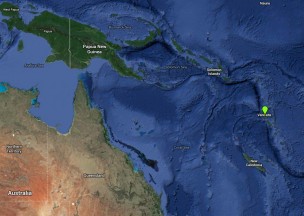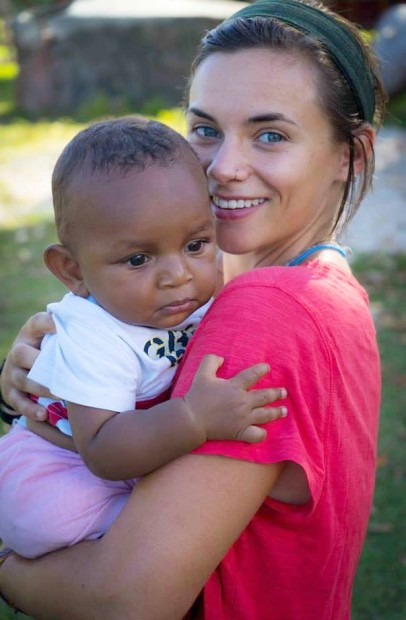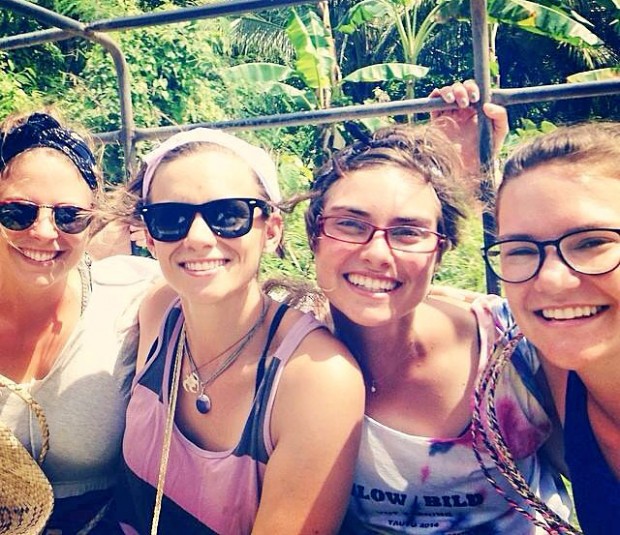South Seas Dispatch
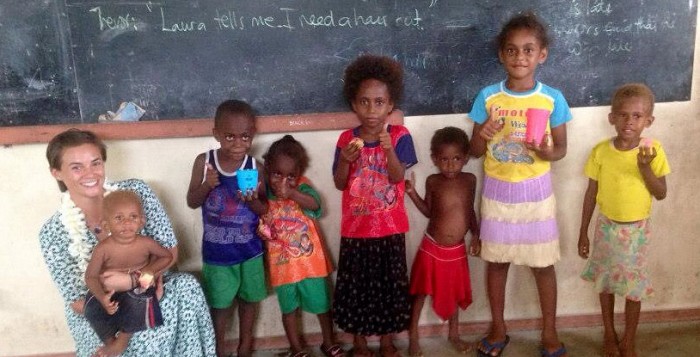
On the Island of Malekula, in the far away nation of Vanuatu, Vineyarder Laura Jernegan teaches English to children, and trains others to become teachers. (Courtesy Laura Jernegan).
Laura Jernegan was born and raised on Martha’s Vineyard and graduated from MVRHS in 2009. After graduating from American University in Washington, D.C., in 2013, she signed up for the Peace Corps and was posted to Malekula in Vanuatu in January 2014.Sunday, Sept. 14, 2014.
My day has begun. From there I turn on some tunes — these days it’s usually Ayla Nereo or the Velvet Underground — and head out to my bush kitchen to build a fire so I can boil water and make some coffee. From there my day will go in a variety of directions, but never fails to provide new adventure, a few laughs and the ever-present reminder that my life on Malekula — the second biggest island in the archipelago nation of Vanuatu — is really, really great.Around 5:30 am the sounds of roosters, dogs, and church bells combine to create the surprisingly peaceful melody that prompts me out of bed every morning. After a little stretch and a few minutes of enjoying the sounds of the morning from my hammock, I unzip my mosquito net and touch my feet down to the cool concrete floor.This is how I start most of my days in Vanuatu, but one Sunday morning I was motivated to go for a run that ended up taking me on an adventure that truly encompasses the life, culture, and beauty that exists everywhere on this island paradise.
After climbing out of my hammock — Peace Corps gave me a mattress, but I prefer sleeping in my hammock — I changed into my culturally appropriate running gear (long pants and a T-shirt), laced up, and headed out to the road. There’s one road that runs through my village connecting my community to Lakatoro, the provincial center on Malekula — approximately two and a half to three hours in the back of a truck, Monday–Friday only. The road is dirt and full of holes and stones of varying sizes, so as I run I have to be sure to keep my eyes on the ground or else suffer another fall that will be just as painful and embarrassing as the first. It’s hard to do anything in Vanuatu without everyone in the village, or even island, knowing. While this sounds like an affront to privacy, it’s really not. Lacking the ability to communicate constantly and affordably as in the United States, “coconut wireless” carries news of births, deaths, family updates, and scandals that often get skewed throughout the villages and islands of Vanuatu.For example, in May I purchased a goat from a nearby village. I live in the middle of a coconut plantation, so I figured the goat could just live in the plantation, frolicking with the other goats and enjoying all the grass it could want for two years. Before I leave I will ask one of my host brothers to help me kill it, and we will all roast it on the beach as a farewell dinner. I didn’t mention my goat purchase to the other volunteers on my island, but about a month later I got a call from one telling me that I was the talk of his village (which is about a five-hour truck ride south) — the white girl from Northwest Malekula who bought a goat. I find this endearing because I know that the only reason that this story got around was because the idea of a white girl buying a goat was actually one of the craziest things that happened recently and everyone wanted everyone else to know.
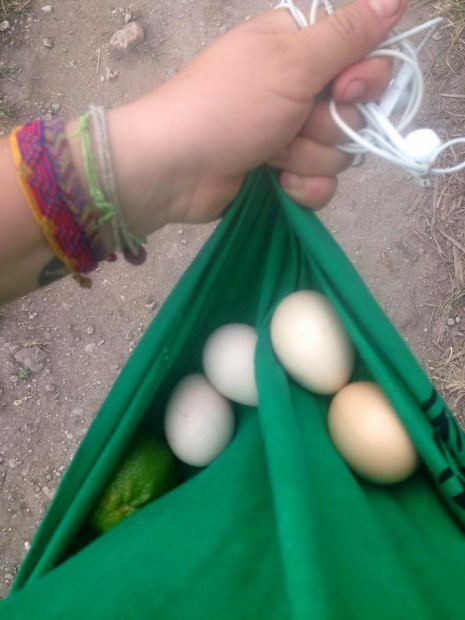
By the end of one recent Sunday, Laura had four eggs given to her by locals she’d seen on her walk/run around the island of Malekula.
So I run with my eyes on the ground to make sure I don’t fall — wanting to avoid the painful scrapes more than the rumors — and decide to go see one of my host sisters. My sister, Makenah, is pregnant, and her husband is currently working as a seasonal laborer in New Zealand — a popular and very fruitful option for Ni-Vanuatu men (and some women) who are able to save up enough for the plane ticket — so she ends up working much harder to clean, cook, and take care of her 3-year-old, Samio, than an 8-month-pregnant woman should. I arrive at her house in about 15 minutes, where she greets me by handing me a freshly picked mandarin and telling me that I work too hard.
My favorite, and perhaps the most important, element of Vanuatu culture is calledstorian (literally story-on). To storian you simply spel (rest) and chat about anything and everything. Men and women in Vanuatu work very hard, taking care of their gardens, which provide all the food they could ever need, from avocados and mangoes to yams and cassavas depending on the season, to raising sometimes as many as nine children, so when they take the time to spel they just relax on a mat woven from natangura leaves and talk. Sometimes there is big news from the capital, but most times storian focuses on the weather, work being done in the village, or coconut-wireless messages about who is getting married or news of a new truck that will be servicing our village.
This Sunday morning the storian focused on me telling my sister not to work too hard and her telling me how excited she is for her husband to come back. Of course we also talked about how it hadn’t rained in a few months, and how excited we are for the rainy season to come to fill our rain tanks with drinking water and bring life back into our crops. After about an hour of storian I decided it was time to head back and get on with all the chores I had to accomplish before the end of the day. As I was about to begin running back to my house, my sister ran into her kitchen and came back with two freshly laid eggs. Eggs make me really excited, because if I want to buy them I have to ride into Lakatoro and pay about $10 round-trip, so when someone gives me eggs it’s a good day. Of course, acquiring these eggs meant I wouldn’t be running back home, so instead I made a pouch out of the front of my T-shirt and carefully walked through the coconut plantation and out onto the main road with two local eggs in tow.
A few minutes down the road I ran into one of my brothers-in-law and was swiftly carried into another storian session. He asked me if I would be willing to help his daughter apply for scholarships to go to university in New Zealand or Australia. She is currently in secondary school at one of the best schools on Malekula, and has been at the top of her class for the past few years. She is passionate about becoming a doctor, and is ready to work hard to achieve this goal. As the sole “whiteman” in the village, I am part of conversations like these often, and my responses are always the same. Of course I’m glad to help in any way that I can, but that’s all I can do — help. As a Peace Corps Volunteer I’m a partner in sustainable development; unfortunately, I can’t just make money appear. My primary assignment is as an English language teacher/teacher trainer, but I am glad to help with anything that my community wants. Luckily the people in my community understand this because I am the fourth Peace Corps Volunteer they have had, so they know that whatever kind of project we venture in on, they are equal partners. This is important for ownership as well as accountability, because once I am gone, the projects I work on need to continue — sustainability is the only goal.
After another 45 minutes of storian with my brother-in-law, ending with me telling him I would be calling my program manager in the Peace Corps office to ask him about scholarships to study abroad, I got ready to head back home. As I was turning to go, he asked me to wait. He ran into his kitchen and came back with two freshly laid eggs. I laughed to myself at how beautifully humorous this was, added them to my T-shirt egg pouch and headed back down the road. Now that I was cradling four eggs, I took my time walking back home. About 30 minutes later I arrived at home. It was now 9 am.
What should have been a casual 30-minute run ended up being a 2.5-hour run/walk adventure filled with family, good storian, and the acquisition of four freshly laid eggs. Long Vanuatu laef hemi olsem nao — in Bislama, “In Vanuatu, life is like this.” Whenever I go anywhere, I try not to have an agenda or a time limit. When walking to the well to get water, I always leave time for spur-of-the-moment storian, and when I walk to school in the morning I am always sure to leave at least 15 minutes early so I can stop to chat with anyone I meet along the way. Understanding “island time” is the key to success in Vanuatu, and is encompassed in the local saying Sipos yu ras bae yu kras, or “If you rush you will crash.” Don’t rush things — if it’s important, it will happen.
It has been only eight months since I arrived in Vanuatu, but my experiences have already instilled invaluable positive changes in my overall mental and physical well-being that any other post-graduate experience just could not compare to. I will probably never speed again in my life — whether it be while driving, spending time with someone, or deciding on the next step in my future. Whatever I would be rushing to do can wait — being careless of the opportunities or dangers on the road along the way can only lead to accidents and missed opportunities.
I came to Vanuatu with the typical Western development-worker mentality that it was my job to change my community, forgetting that with this I would be changed as well. Life isn’t always easy, but when I have to struggle is when I learn the most. This isn’t something specific to my life in Vanuatu; it’s something I believe we must acknowledge every day, wherever we are, so that when our time on earth is over we can be confident that whatever we did, we did it right — without regrets, avoidable accidents, or missed opportunities. Laef hemi olsem nao.
A conversation with Laura Jernegan
Tell us about the Peace Corps application process. You apply online, then wait to be contacted for an interview. After the interview you get a nomination, and then wait to hear where you’re being sent, what kind of work you’re going to be doing, and when you’ll be leaving. You don’t have much control over any of these things, except for your work/volunteer experiences, which funnel you into a job placement. I was at work at Katama Airfield in July 2013 when I received an email saying I’d be going to Vanuatu in January 2014.
How’s the weather? Can you drink the water? Weather is subtropical — really, really hot and rainy from November to March, then still very hot but dry from March to November. My drinking water comes from rain tanks at my school, but the only other rain source is a well where everyone else in the village goes for water. Once our rain tanks are dry, I use the well water but filter it through a water filter given to me by Peace Corps.
Does anyone there know where Martha’s Vineyard is? No, but it’s always great when they ask where I’m from and I get to tell them I’m from a small island too. I joke that growing up on an island prepared me for life on Malekula, but really that would be far less than accurate. Besides being used to taking a boat or plane to get home, not much could have prepared me for life here. They are always astounded when I tell them that no, my island doesn’t have coconut plantations or papaya trees everywhere, or that the water is pretty cold most of the year, so swimming isn’t an everyday thing. Being able to share information about my life on Martha’s Vineyard has been a really special part of life here because for Ni-Vanuatu people, it’s hard to think about life on any other kind of island. My connection to the Vineyard has only intensified since settling into life on this very beautiful but very different island paradise, but I know that it will last for the rest of my life.

